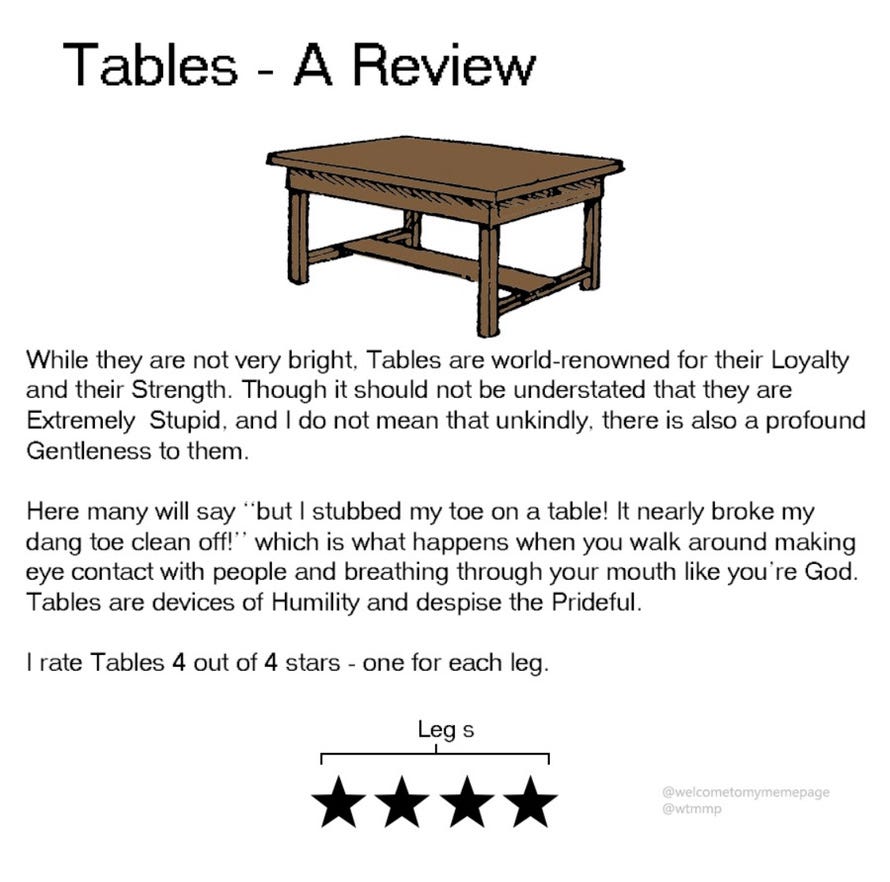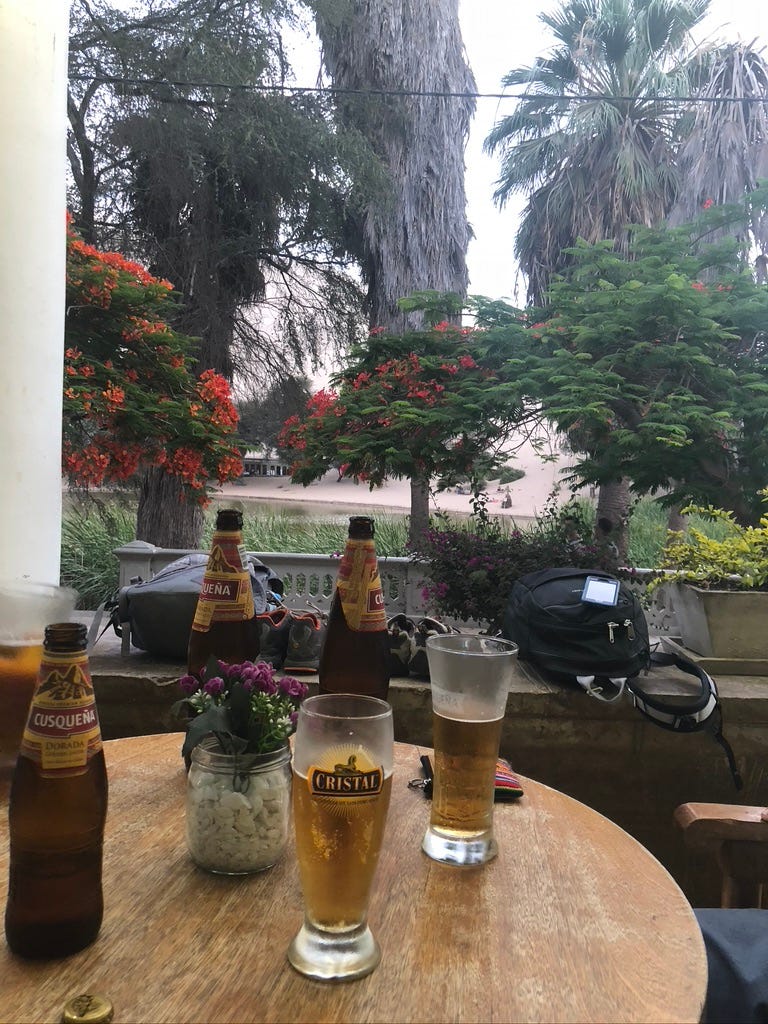A Table Gathers And Distinguishes Us
The world, like every in-between, relates and separates men at the same time
I grew up in Syracuse, New York, a city that you’ve either heard of because a) you like college basketball or b) you keep a close eye on listicles covering topics like “The 10 WORST Winter Weather Cities in America.” (Otherwise you might not have heard of it at all.) In keeping with that distinction the whole area got pounded with snow a few days ago; the drifts piled up so high south of Syracuse that people had to dig their way out of their homes.
This was par for the course when I was growing up, and in any normal year I would be back in that frozen tundra right now, probably doing something like this:

But of course this is not a normal year, and so instead of fighting evergreen trees out in a snowy field with my family and their dogs, I am still in Washington, trying to make peace with the second-ever Christmas I’ll spend without them. I mean, 29/31 is a pretty good record, and I feel beyond blessed to even have had that many. Still…we’re not talking about a grade, we’re talking about quality time with the people who have known me longest and best.
What I’ll miss this year is neatly summed up by L.M. Sacasas, whose The Convivial Society newsletter is always interesting and engaging, even when I’m too dumb to comprehend most of it. He writes, citing Hannah Arendt:
Arendt argues that to live an “entirely private life means above all to be deprived of things essential to a truly human life.” She expands on this by explaining that it means that one is “deprived of the reality that comes from being seen and heard by others, to be deprived of an ‘objective’ relationship with them that comes from being related to and separated from them through the intermediary of a common world of things.”
Christmastime has, since college, been for me one of the most emphatic breakdowns of “private life” I can imagine. My annual pilgrimage back to Upstate New York to be with my family means renegotiating all sorts of boundaries: the shower, the fridge, the bathroom, the television. The obligations and intrusions of a full household at the height of holiday bustle are manifold. As a full family, none of us are granted the peace and privacy that we’ve each worked to build in our own lives, but then, that’s the point. To live that way all the time—physically or emotionally—means depriving ourselves of what makes us ourselves. To exist as a person is not a one-way function, receiving input and interpreting it and putting forth a reaction. We must also be interpreted by others to make ourselves human, in a constant flow of input and output, which I suspect is sort of the purpose of having a family at all: a unit, biological or found, in which one can be squeezed into this process and so become (and make others) more fully human.
So: it’s often at the holidays when we are most able, I think, to experience ourselves fully, which is to say to see ourselves translated back to us by other people. That much of this translation happens around tables also seems to be no accident. Sacasas continues:
“To live together in the world,” Arendt wrote in the paragraph that first caught my attention, “means essentially that a world of things is between those who have it in common, as a table is located between those who sit around it; the world, like every in-between, relates and separates men at the same time.”
So there it is: our life together is built upon a world of things, which, like a table, gathers and distinguishes us.
I don’t know about you all but god damn, have I missed sitting around tables this year. (I can’t even approximate sitting around them at home—my wife and I sit on the same side of our tiny coffee table to eat.) Unlike life’s grander events, which usually happen elsewhere, my life’s table moments are not especially memorable in isolation but have been indelibly formative in sum. The meals prepared with love over the course of a day, the meals hastily assembled from whatever a gas station had to offer. The passionate arguments with friends increasing in volume with each new drink consumed around a bar’s table, which did not matter at all the next day. Card games that lasted into the wee hours, for as long as a best-of-seven-or-nine-or-eleven series could reasonably be insisted upon. I have slept on tables and under them—sometimes even intentionally.
When I sit around tables with my family or friends—or occasionally stand around them yelling—I experience the juxtaposition so clearly: I am at once obviously myself, staking out my own portions and positions and bets; and part of something that subsumes me, a collective set of rules and rituals and agreed upon behaviors and shared histories.
Through these rituals, Sacasas explains, we develop our common sense.
Common sense is not just a set of mundane observations that are widely assumed to be true. Rather, it was common in the sense that it was the product of the senses working in tandem on a world held in common with others.
“Only the experience of sharing a common human world with others who look at it from different perspectives,” she wrote, “can enable us to see reality in the round and to develop a shared common sense.”
However, in the modern world Arendt argued, common sense “became an inner faculty without any world relationship…This sense now was called common…merely because it happened to be common to all. What men now have in common is not the world but the structure of their minds.” And that is a critical point aptly stated.
Moreover, she observes that “a noticeable decrease in common sense in any given community and a noticeable increase in superstition and gullibility are therefore almost infallible signs of alienation from the world.” Again, she does not mean alienation from the earth, but alienation from a common world of human things that constitutes a public space…within which a common sense can take hold and bind individuals to a commonly shared reality.
The alienation and deprivation of this year have been far-reaching and stark, and the consequences of those lacunae will have echoes for generations. We cannot know what the other side might look like yet. But we have to keep the faith, and get to work making things better how we can.
And if it brings you comfort, consider the words of Judge Clinton Sternwood:
When these frail shadows we inhabit now have quit the stage, we'll meet and raise a glass again together in Valhalla.
I’ll talk to you next week.
-Chuck
PS - If you liked what you read here, why not subscribe and get this newsletter delivered to your inbox each week? It’s free and always will be.





